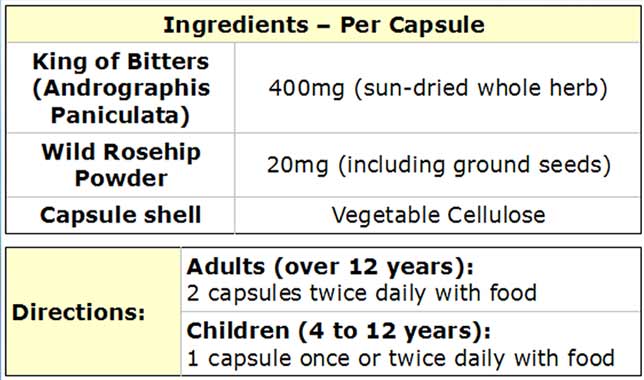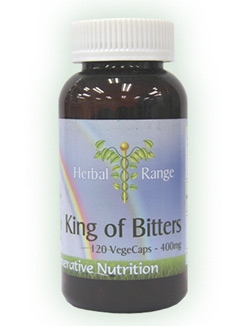King of Bitters
- Information
- Ingredients/Directions
- Further Reading
- Health Uses
King of Bitters works to improve liver and gall bladder function, increase bile flow to aid digestion, and can be as effective as Milk Thistle in benefiting liver function when the liver is toxic or under stress.
Andrographis Paniculta Uses:
- Anti-bacterial
- Anti-viral
- Anti-inflammatory
- Aids digestion
- Prevents blood clots
- Boosts immune system
- Protects against cancer
- Helps to lower blood pressure
- Can aid gall stone removal
The anti-bacterial and anti-viral benefits may be used to help overcome the symptoms of Hepatitis and boost the immune system to clear infections such as Malaria. King of Bitters triggers fibrinolysis, a process in the body that dissolves blood clots and helps to lower blood pressure.
The organs helped by King of Bitters are mainly the gall bladder, heart and liver
|
Some facts about Andrographis Paniculta
In Ayurvedic medicine it is called "dark cloud" or Kalamegha, and can be Bhui-neem, which means "neem of the ground", because the small herb plant tastes similar to the strong bitter large Neem tree (Azadirachta indica). A third name for King of Bitters is ‘bile of earth’ a Malaysian translation from Hempedu Bumi which also refers to its bitter taste.
King of Bitters has for many years been used in Indian tribal medicine, and within traditional Siddha and Ayurvedic systems as well as in clinical medicine in other countries. King of Bitters is popular for its effect on enzymes.
The Andrographis Paniculata shrub grows well in the moist and shady areas of India and China and across Southeast Asia. Many Chinese households keep Andrographis at home for treatment of digestive complaints and colds.
It’s believed that King of Bitters helped to ease the Indian flu epidemic of 1919, and is widely recommended by Scandinavian doctors for treatment for cough, colds and flu in the winter and can sometimes be called the "Indian Echinacea”. Research is also starting to unveil that King of Bitters may also be important for cardiovascular treatment and cancer treatments.
Please read the other tabs of this page for more information on introducing King of Bitters into your diet, advice and research for King of Bitters. |

Andrographis paniculata is recognized for its purported blood-purifying properties and has been used in traditional Asian medicine to treat conditions believed to be related to impurities in the blood, such as boils, scabies and other skin conditions.
Andrographolide and two related compounds showed antiviral properties against herpes virus in a study conducted by the Faculty of Pharmaceutical Sciences, Khon Kaen University, Thailand. All three were less than 50 percent effective at preventing infection with the virus. However, one of the compounds totally inhibited the virus after infection was established and another was moderately effective at inhibiting the virus post-infection. The compound that exerted complete inhibition of the virus stopped the virus in its early phases of replication. The study was published in the May 2011 issue of the journal "Medicinal Chemistry." Andrographis Paniculata is used widely to treat fevers like chiken-guinea flu (bird flu), swine-flu, typhoid etc.
Antibacterial/Antifungal
Researchers at the Department of Pharmaceutical Chemistry, Khon Kaen University, Thailand reported on antibacterial properties of Andrographis paniculata in a laboratory study published in the January 2011 issue of the journal "Archives of Pharmaceutical Research." Andrographolide and its derivitive molecules were tested against several bacteria and Candida albicans, the organism responsible for many yeast infections. The bacteria Bacillus subtilis, a soil-dwelling bacteria that can contaminate food, was most effectively inhibited. Researchers noted that their experiment was the first to document antibacterial properties of Andrographis paniculata. The plant extract exhibits antityphoid and antifungal activities
Asthma Treatment
Andrographis paniculata may be useful for treatment of asthma, according to a study conducted at the Department of Pharmacology, Yong Loo Lin School of Medicine, Singapore. In the tissue culture and laboratory animal study, a derivative of andrographolide decreased levels of eosinophils, a type of white blood cell that is triggered in asthma, and antibodies. Andrographolide is an active constituent of Andrographis. Mucus production, histamine levels, proinflammatory molecules and airway irritation were all reduced. The derivative compound was safer than andrographolide, itself, which is known to have toxic effects. The study appeared in the May 2011 issue of the "Journal of Natural Products."
Colds, Flu, Sinusitis: Andrographis compounds have shown antivirus properties which appear to inhibit glycoprotein's in the virus. This impedes the viruses ability to invade cells in the body and replicate. It's andrographolide are currently being studied for the antiviral effects they have on avian bird flu virus and the ebola virus. It also has a major effect activating the general defense functions of the immune system by stimulating the production of antibodies as well as non-specific immune responses such as increased macrophage phagocytosis, rather than by any direct anti-microbial activity. Clinical studies have demonstrated it's efficacy fighting colds, flu, sinusitis, pharyngotonsillitis, familial mediterranean fever and upper respiratory tract infections. It also has been demonstrated to reduce the risk of colds and prevent flu and complications when used as a preventative.
Anti-inflammatory: There appears to be a significant presence of flavanoids in the Andrographis Paniculata herb, which always have an anti-inflammatory affect. In vitro studies have shown that the flavinoid activities supressed the genetic expression of neutrofils, an inflammatory agent. Similarly, studies have indicated that a variety of inflammatory proteins, including COX-2, are reduced by the presence of Andrographoloid.
Anti-tumor: In vitro andrographolide studies indicate an immuno-stimulating activity as well as a marked inhibitory effect. Its presence increases proliferation of lymphocytes and production of interleukin2, TNF-alpha production and cytotoxic activity of lymphocytes against certain cancer cell lines, as well as demonstrating potential direct anti-cancer activity by the induction of cell-cycle inhibitory protein p27 and decreased expression of cyclin-dependent kinase.
A study conducted at Bastyr University, showed a significant rise in the mean CD4 lymphocyte level of HIV subjects after administration of 10mg/kg andrographolide.
Precautions:
- Asthma
- Autoimmune disorders
- Bacterial Infections
- Biliary Colic
- Bird Flu
- Blood Pressure (High)
- Bronchitis
- Cancer
- Candida Albicans
- Cardiovascular Disease
- Circulation (Poor)
- Colds
- Colic
- Colitis
- COPD
- Coronary Disease
- Coronary Heart Disease, Circulatory Disorders, High Blood Pressure
- Coughs
- Digestive Problems
- Heart Disease, Circulatory Disorders, High Blood Pressure
- Hepatitis
- High Blood Pressure
- Hypertension
- Infections & The Immune System
- Influenza
- Laryngitis
- Liver Congestion
- MRSA
- Parasites
- Sinusitis
- Sore Throat
- Thrush
- Tonsillitis
- Ulcerative Colitis
- Viral Infections
- Worms







